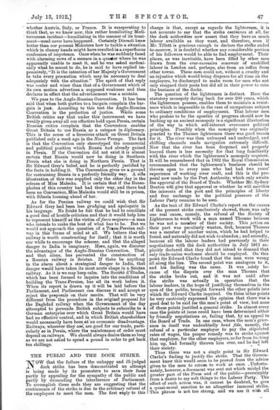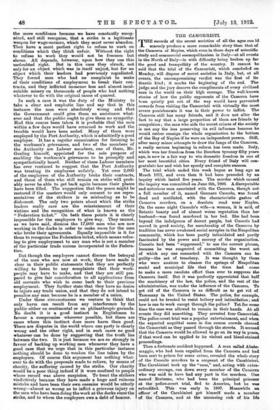THE PUBLIC AND THE DOCK STRIKE.
NOW that the failure of the- unhappy and ill-judged dock strike has been demonstrated an attempt is being made by its promoters to save , their faces partly by appealing for the sympathy of the public and partly by demanding the interference of Parliament. To accomplish these ends they are suggesting that the continuance of the strike is due to the arbitrary refusal of the employers to meet the men. The first reply to this charge is that, except as regards the lightermen, it is not accurate to say that the strike continues at all, for the dock authorities now assert that they have as much labour available as they want, and therefore, even if Mr. Tillett is gracious enough to declare the strike ended to-morrow, it is dotibtful whether any considerable portion of his followers would be able to find employment. Their places, as was inevitable, have been filled 'by other men drawn from the ever-excessive reservoir of unskilled labour in London and, perhaps, also from an influx from other towns. These men could not, without a cruelty and an injustice which would bring disgrace for all time on the employers, be discharged to make room for men who not only resigned their posts but did all in their power to ruin the business of the docks.
The question of the lightermen is distinct. Here the statutory monopoly dating back for over 200 years, which the lightermen possess, enables them to maintain a resist- ance which is impossible in the case of occupations subject to ordinary conditions of employment. That labour men who profess to be the apostles of progress should now be backing up an ancient monopoly is a significant illustration of the way in which self-interest overcomes political principles. Possibly when the monopoly was originally granted to the Thames lightermen there was good reason for it. The river was then unbuoyed and undredged, and shifting channels made navigation extremely difficult. Now that the river has been deepened and properly buoyed there is less necessity for that long familiarity with the river which the lightermen's monopoly requires. It will be remembered that in 1902 the Royal Commission recommended that the lightermen's business should be thrown open to every man who had had two years' experience of working river craft, and this is the pro- posal now made by the Port Authority, which only awaits the approval of the Board of Trade. Whether Mr. Sydney Buxton will give that approval or whether he will sacrifice the interests of the port and the principles of liberty and free exchange to the political pressure of the Labour Party remains to be seen.
As the text of Sir Edward Clarke's report on the causes of the present strike conclusively showed, there was only one real causer namely, the refusal of the Society of Lightermen to work with a man named Thomas because he was not a- member of their society. This _action on their part was peculiarly wanton, first, because Thomas was a member of another union, which he had helped to foUnd, and naturally did not wish to abandon ; and secondly, because" all the labour leaders had previously in their negotiations with the dock authorities in July 1911 ex; plicitIy declared -that they did not intend to demand that only trade-union workmen should be employed. On- this point Sir Edward Clarke fount that the men were wrong all along the line. The second point was analogous to it, and his finding was the. same. It was solely be- cause of- the dispute over the man Thomas that the strike broke out, and it was not until after the strike was actually in operation that the labour leaders, in the hope of justifying themselves, in the eyes of the public, brought forward the other points into which Sir Edward Clarke inquired. On these 'other points he very cautiously expressed the opinion that there was a good deal to be said for the men's point of view, but none of these points justified a, general strike. In. almost every case the points at issue could have been determined either by friendly negotiations or, failing that, by an-appeal to the Board of Trade. In one case, where the men's griev- ance in itself was undoubtedly bond fide, namely, the refusal of a particular employer to pay the stipulated rates of wages, the proper remedy was to strike against that employer, for the other employers, so far from backing him up, had formally thrown him over, and he had left their society. Thus there was not a single point in Sir Edward Clarke's finding to justify the strike. That the Govern- ment knew this would seem to be proved from the advice given to the men to return to work at once. _ Unfortu- nately, however, a document was sent out which miskd the greater part of the Press and of the public—prestimably from a desire to say soft things to the Labour Party: The effect of such action was, it cannot l;m3 doubted, to give a quasi-moral sanction to an altogether immoral strike. This phrase is not too strong, and we use it with all the more confidence because we have constantly recog- nized, and still recognize, that a strike is a legitimate -weapon for wage-earners, which they must never abandon. They have a most perfect right to refuse to work on conditions which they think unfair. Without the right to refuse to work they would not be freemen but slaves. All depends, however, upon how they use this undoubted right. But in this case they struck, not only for an object which was in itself unjust, but for an object which their leaders had previously repudiated. They forced men who had no complaint to make of their conditions of employment to break their con- tracts, and they inflicted immense loss and almost incal- culable misery on thousands of people who had nothing whatever to do with the original cause of quarrel.
In such a. case it was the duty of the Ministry to take a clear and emphatic line and say that in this instance the men were absolutely wrong and that the Government could give them no assistance what- ever and that the public ought to give them no sympathy. Had this course been taken it is probable that the men -within a few days would have returned to work and the trouble would have been ended. Many of them were employed by the Port Authority, which is admittedly a good employer. It has a regular organization for listening to the workmen's grievances, and two of the members of the Authority are Labour members, one of them, Mr. Gosling himself, appointed for the sole purpose of enabling the workmen's grievances to be promptly and sympathetically heard. Neither of these Labour members has ever ventured to suggest that the Port Authority was treating its employees unfairly. Yet over 2,000 of the employees of the Authority broke their contracts, and those of them who still remain on strike will prob- ably never be able to get back again because their places have been filled. The suggestion that the peace might be restored if the masters would only consent to see repre- sentatives of the strikers is se misleading as to be dishonest. The only two points about which the strike leaders really care are the reinstatement of their victims and the recognition of what is known as the
Federation ticket." On both these points it is clearly impossible for the employers to give way. They cannot, -as we have said, dismiss the 17,000 men who are now working in the docks in order to make room for the men :who broke their agreements. Equally impossible is it for them to recognize the Federation ticket, which means refus- ing to give employment to any man who is not a member of the particular trade unions incorporated in the Federa- tion.
But though the employers cannot discuss the betrayal of the men who are now at work, they have made it clear in their public statements that they are perfeetly =willing to listen to any complaints that their work- people may have to make, and that they are still pre- pared to give fair consideration to all applications from old servants who wish to come back to their previous employment. They further state that they have no desire to injure any trade union, and that they do not intend to penalize any man because he is a member of a union. Under these circumstances we venture to think that only harm can result from any interference by the public either on sentimental or on philanthropic grounds. No doubt it is a good instinct in Englishmen to favour a compromise wherever possible, but there are cases where this instinct does more harm than good. There are disputes in the world where one party is clearly wrong and the other right, and in such cases no good whatever can be done by suggesting that the truth lies between the two. It is just because we are so strongly in favour of backing up working men whenever they have a good case that we urge that in this particular instance nothing should be done to weaken the line taken by the employers. Of course this argument has nothing what- ever to do with the proposals made to relieve, by means of charity, the suffering caused by the strike. Our charity would be a poor thing indeed if it were confined to people whose record was above suspicion. To treat the strikers vindictively because they have made a huge and ruinous mistake and have been their own enemies would be utterly wrong—almost as wrong as to inflict a grievous injury on the men who have been doing the work at the docks since the strike, and to whom the employers owe a debt of honour.







































 Previous page
Previous page